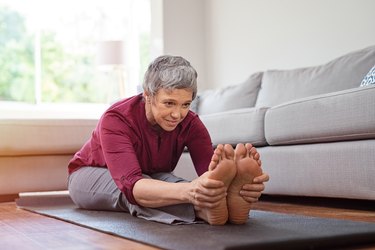
If you notice that your joints snap, crackle and pop louder than a bowl of Rice Krispies lately, your age could have something to do with it.
While joint cracking is normal and can happen at any age and any time (like your knee popping when you squat or your elbow or shoulder cracking when you work out), there are a few specific explanations for why your joints crack as you age.
Video of the Day
Video of the Day
Here, New York City-based spinal and orthopedic surgeon Gbolahan Okubadejo, MD explains why your joints become prone to cracking as you age, plus possible ways to reduce cracking and maintain healthy joints as you grow older.
2 Reasons Your Joints Crack as You Get Older
In general, "joint cracking results from a release of nitrogen air buildup in your synovial fluid — the thick liquid located between your joints that acts as a lubricant," Dr. Okubadejo says.
Once this naturally-occurring nitrogen air builds up, it forms bubbles. "As bubbles accumulate in the joint, the space feels tight, and we feel a need to relieve this tension," Dr. Okubadejo says. "Cracking the joints enables this release of air from these nitrogen-filled bubbles," he explains.
Cracking can happen on its own or done by manually cracking elbows, hips, knuckles, etc. Sometimes, the popping sound may even point to tight tendons or muscles generating friction around the bone, according to the Cleveland Clinic.
But if your joint cracking appears more pronounced with age, here's why:
1. You Have Increased Joint Laxity
In other words, your joints might be a little looser and unstable.
"As we get older, there tends to be more laxity in the joints and less structural integrity of the capsules around the joints," Dr. Okubadejo says. "This allows more air to get into the joints and form bubbles [in the synovial fluid]."
As we know, nitrogen accumulates in these spaces between your joints, and when the gas is compressed and released, it results in the quintessential cracking sound.
Because nitrogen bubbles are more present in the synovial fluid of older adults, you will tend to hear more snaps and pops as you age.
2. Your Cartilage Wears Away
Cartilage — tissue that acts as a shock absorber between your joints — wears down as you age, per the Cleveland Clinic. That means over time, your joints will become less smooth and begin scraping against each other, causing a more prominent popping sound. (Ouch.)
If your joints make more of a crunching sound versus a pop, you may have crepitus: a condition often found in patients with knee arthritis that may require a brace, physical therapy or pain relief, per Aurora Health Care.
"In these situations, joint tissue is also diseased, further worsening the popping/cracking," Dr. Okubadejo says.
Should You Be Worried About Cracking Joints?
While cracking joints might sound unsettling, they are (in most cases) no cause for concern. In fact, cracking is quite common and in isolation, does not cause injury to the joints or ligaments, Dr. Okubadejo says.
But, if you have symptoms accompanying the crack, such as swelling, redness or persistent pain, you might be dealing with a more serious issue like osteoarthritis, Dr. Okubadejo says. "In those cases, patients should consult with their primary physician or orthopedic surgeon for a consultation and imaging to rule out underlying issues," he says.
Related Reading
How to Treat Creaky Joints
"There isn't much one can do to prevent cracking, " Dr. Okubadejo says. "The flow of air into joints is natural and uncontrollable."
That said, Dr. Okubadejo adds that stretching as you age can help keep the muscles and joints limber. And as physical therapists tend to say, motion is lotion.
In other words, the more you move throughout the day, the more frequently your synovial fluid can flow, ensuring your joints stay lubricated, according to the Cleveland Clinic. This may, in turn, reduce some of that persistent popping.
Is It Safe to Crack Your Own Joints?
In an effort to decrease damage to your joints, you should try to limit intentional cracking, Dr. Okubadejo says.
While a back crack or knuckle pop may feel good now and then, cracking too frequently or forcefully can strain the ligaments around the joints, he explains. This can worsen the cracking situation and create other problems.
Tip
If you can't resist the urge to crack (like twisting your back in your desk chair), once a day or once every few days is safe, per the Cleveland Clinic. Cracking several times a day to relieve pain could indicate a larger issue. Instead, try these gentle desk stretches mid-day.
Is this an emergency? If you are experiencing serious medical symptoms, please see the National Library of Medicine’s list of signs you need emergency medical attention or call 911.